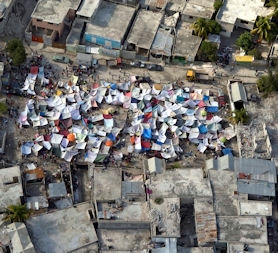Haiti aftermath: the wait for aid
Thousands of people injured in the Haiti earthquake lie waiting in the streets of Port-au-Prince, as emergency aid slowly trickles in and desperation turns to anger.

In one part of the city it is reported Haitians have set up roadblocks made of corpses, to protest at the delay in emergency supplies reaching them.
A photographer told reporters: “They are starting to block the roads with bodies, it’s getting ugly out there, people are fed up with getting no help.”
Around 50,000 people are feared dead after Tuesday’s 7.0 magnitude earthquake, with millions more injured, orphaned or homeless.
Thousands have spent a third night sleeping in the streets. There are fears the island nation’s infrastructure is so badly damaged it will take decades to rebuild and may never truly recover.
Slow progress
Aid shipments are arriving, but slowly. An American aircraft carrier containing supplies is due to arrive later today.
The USS Carl Vinson will serve as a “floating airport” for relief operations by its 19 helicopters. President Obama says it is one of the biggest emergency operations ever undertaken by the US.
He has promised £100m USD (£61.4 million) for the relief effort and the International Monetary Fund (IMF) has matched the figure.
Slow progress
Aid shipments are arriving, but slowly. An American aircraft carrier containing supplies is due to arrive later today.
The USS Carl Vinson will serve as a “floating airport” for relief operations by its 19 helicopters. President Obama says it is one of the biggest emergency operations ever undertaken by the US.
He has promised £100m USD (£61.4 million) for the relief effort and the International Monetary Fund (IMF) has matched the figure.
The first cruise ship to dock in Haiti, with food supplies on board, is also scheduled to arrive in the next few hours. The Independence of the Seas, a Royal Carribean vessel, is loaded with rice, dried beans, water, dried milk and other canned items.
Aid workers are calling for more dried food and MREs (ready-to-eat meals), because few survivors have equipment for cooking.
The priority at the moment is burying the dead to prevent disease spreading, and getting clean water and food to the injured.
British effort
The first British search and rescue workers to arrive in Port-au-Prince are searching the rubble for survivors.
Supplies and aid workers – including 64 search and rescue staff from UK fire services – have been held up because of the lack of runway space in the city’s overstretched airport.
Gordon Brown has called for the world to respond as the British government pledged £6 million aid.
One man told journalists: “We’ve been out here waiting for three days and three nights but nothing has been done for us, not even a word of encouragement from the president. What should we do?”
You can pledge cash to the recover effort here: DEC Haiti Earthquake Appeal. You can also phone 0370 60 60 900.
Mass graves
Bodies lie all around the hilly city, with people covering their noses to block the stench of death. Corpses are piled on pickup trucks.
Haitian President Rene Preval said 7,000 bodies have already been buried in one mass grave alone. Some of the victims may never be identified.
Rezene Tesfamariam, who works for Plan International in Haiti, said people were using their bare hands, shovels and pick-axes to dig under collapsed buildings.
He said: “Port-au-Prince looks like it has been bombed.
“My house has been destroyed. I went back there (in the aftermath) and a neighbour called my name. She said there were children under the rubble.
“There are people everywhere crying out for help. It is one thing I will never be able forget.”
-
Latest news
-
Taylor Swift’s new break-up album breaks records3m

-
NHS trust fined £200K for failings that led to death of two mental health patients3m

-
Sunak vows to end UK ‘sick note culture’ with benefit reform3m

-
‘Loose talk about using nuclear weapons is irresponsible and unacceptable’, says head of UN’s nuclear watchdog3m

-
‘There wasn’t an Israeli attack on Iran,’ says former adviser to Iran’s nuclear negotiations team7m

-




